PARIS, France — “To be inclusive doesn’t mean to point at something and be like, ‘that’s different, let’s love it,’” said Chika on stage at the first BoF 500 Symposium on Sunday morning. Being inclusive “literally means existing, and if anyone wants to challenge that...then I have the language, the rhetoric, the vocabulary to challenge them.”
The musician, artist and rapper addressed an audience of industry leaders and guests gathered at Galeries Lafayette Champs-Élysées in the middle of Paris Fashion Week for the #BoF500 Symposium, in partnership with JHSF, to hear from some of the change agents working to create a more inclusive fashion industry.
Today’s symposium comprised three talks on the authentic representation of disabled voices, the LGBTQIA+ community and racial diversity in fashion and was designed to bring BoF’s latest print issue — focused on inclusion — to life. The event was led by members of the BoF500 community, including activist Sinéad Burke, Out Editor-in-Chief Philip Picardi and designer Dapper Dan, who detailed how they are using their voices to create meaningful conversations around gender and sexuality, race, and disability.

Attendees at the BoF 500 Symposium | Source: Getty
While sustainability is fashion's current buzzword, in past years all too frequently diversity and inclusion have been treated as industry trends, with surface-level engagement via consumer-facing ad campaigns, fashion shows or high-profile chief diversity officer appointments to appease customers. And yet in the past 12 months alone there have been a series of missteps by a host of brands, from Gucci and Prada blackface scandals to D&G’s chopstick controversy, leading to a sizeable social media backlash or a downturn in sales. Industry leaders want to engage with diversity and understand that to do this, they need to connect across minority communities. Despite efforts to better address inclusion, too many companies are missing the mark.
Tokenism Does Not Equal Inclusion
“There is a risk in fashion that we treat diversity and inclusivity as trends,” said BoF founder and chief executive Imran Amed as he introduced Picardi and model Teddy Quinlivan in conversation with YouTube’s head of fashion and beauty partnerships Derek Blasberg to speak on inclusion as it concerns the LGBTQIA+ community.

Derek Blasberg, Teddy Quinlivan and Phillip Picardi | Source: Getty
“Diversity and inclusion are buzz words that often lead brands to jump on a trend and to do the least amount of work to show that they are being inclusive, but ultimately unless you’re engaging 365 days of the year, you can’t be considered inclusive,” Picardi said.
While support of the community during annual Pride celebrations by banks, major fashion labels and corporations is always welcome, said Picardi, “I wish that those companies would show their support beyond Pride Month, because I’m gay every day of the year.”
Picardi’s attitude on need to avoid tokenism was shared across the event’s three panels. Social media platforms have made it easier than ever before for brands to show they are engaging with “difference,” but those who are offered a seat at the table aren’t given enough support to leverage that position to enact lasting change.
Education Through Interaction
Legendary designer Dapper Dan — joined by Chika and Teen Vogue Editor-in-Chief Lindsay Peoples Wagner to talk about how the fashion industry can truly represent more diverse groups — pointed out that Generation Z’s ability to engage with conversations around diversity and inclusion have “changed the face of fashion,” and this is also having “ripple effects across society.” Education must happen directly between brands and their consumers.

Lindsay Peoples Wagner, Jane Chika Oranika and Dapper Dan | Source: Getty
The use of people from under-represented communities in customer-facing projects and ad campaigns sat uneasily for a number of the speakers. Teddy Quinlivan spoke of her issue with being marked solely as a “transgendered top model” following her coming out to the industry. The sentiment was echoed by Chika, who said that she is often labelled as plus-sized, queer or androgynous, but in order to “really understand what inclusivity means, we have to, in a way, stop talking about it”.
“The more that we draw attention [to it], we begin to validate the standard and that’s the opposite of what we’re trying to do,” she said.
Change Starts With Better Hiring Practices
What can be done by brands to engage with inclusion more meaningfully? First, change needs to start within Human Resource departments, said Picardi, but not just in the composition of board rooms. Fashion needs better tools to engage with junior staff in cross-level conversations.
Greater visibility within companies was also touched upon in the third panel by Cur8ble founder and stylist Stephanie Thomas and model Jillian Mercado, who were joined by activist Sinéad Burke to talk about the authentic inclusion of disabled voices in fashion.

Sinead Burke, Stephanie Thomas and Jillian Mercado | Source: Getty
Approximately one in four adults lives with a disability and yet, adaptive fashion is still not well understood as a business and design opportunity. Nor are disabled people considered as valuable employees and curators within the industry. Inclusion doesn’t just mean hiring a diversity or inclusion officer. Burke called for a disabled chief executive in the industry, while both Mercado and Thomas spoke of the need for brands to acknowledge that designing for disability brings designers a moment of innovation that will bring positive impact for all customers.
A Seat At The Table
Who has a seat at the table, and how that position is utilised, was a pressing concern in all three symposium talks: “The fashion industry is a big table with a lot of seats and we need to invite people to sit at our table,” said Quinlivan.
“Education can only happen with interaction,” said Thomas on the need for hiring to better reflect disabled employees and consumers, adding that the social return on investment for companies who have the right people in the room will be unprecedented. While it is disappointing that we’re only just realising these people are needed in 2019, “when we start with diversity in mind, we move less to diversity and more towards equity,” said Burke.
For all the panelists, the need to make sure inclusive conversations aren’t just lip service is a mantle worth picking up, even if it means highlighting their “otherness.” As Quinlivan said, “If that’s what it takes for people to wake up… Fuck it.”
On September 29th, BoF hosted the #BoF500 Symposium in Paris in partnership with JHSF and Tmall.
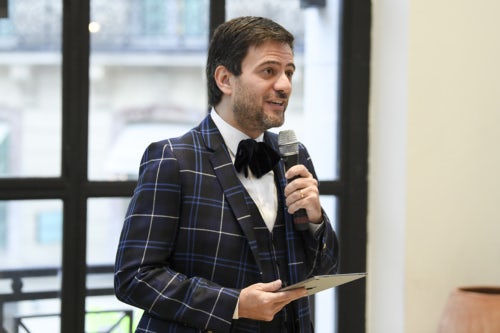
JHSF Chief Creative Officer Bruno Astuto speaks on stage at the BoF 500 Symposium | Source: Getty
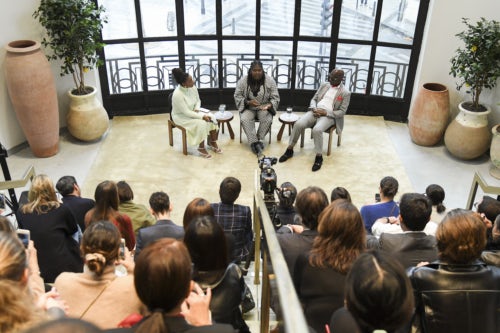
Lindsay Peoples Wagner, Jane Chika Oranika and Dapper Dan on stage at the BoF 500 Symposium | Source: Getty
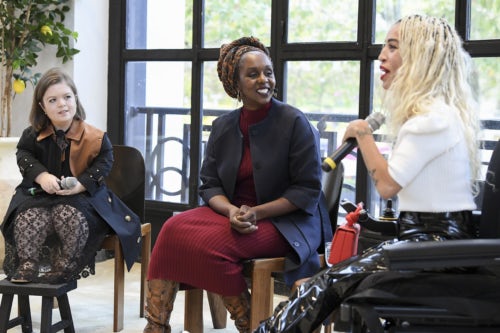
Sinead Burke, Stephanie Thomas and Jillian Mercado | Source: Getty
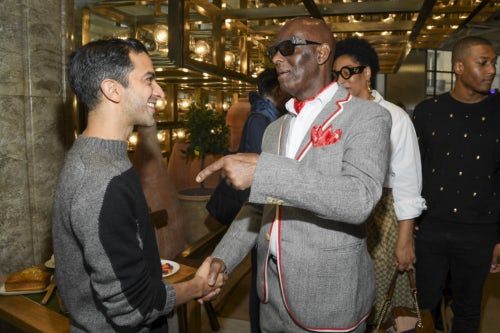
Imran Amed welcomes Dapper Dan | Source: Getty
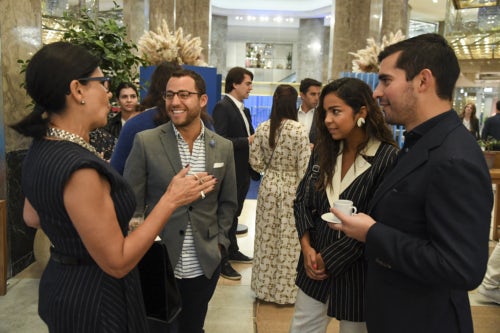
Guests attend the BoF 500 Symposium | Source: Getty
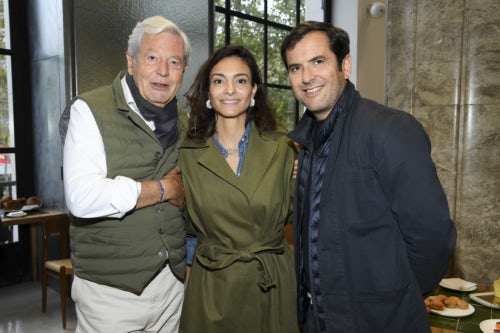
Philippe Houze, Nadia Dhouib Boussabah and Nicolas Houze | Source: Getty
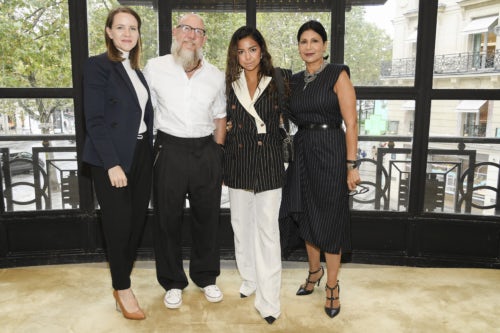
Eleanor Turner, Michael Fink, a guest and Carmela Spinelli | Source: Getty
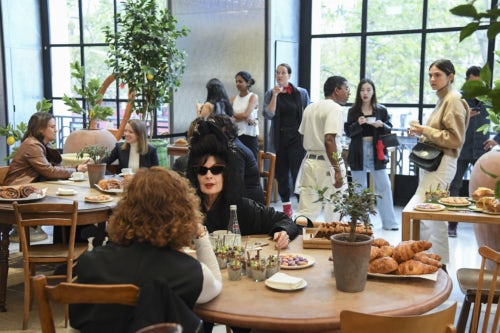
Guests attend the BoF 500 Symposium | Source: Getty
Startups
via https://aiupnow.com
Sarah Schijen, Khareem Sudlow
